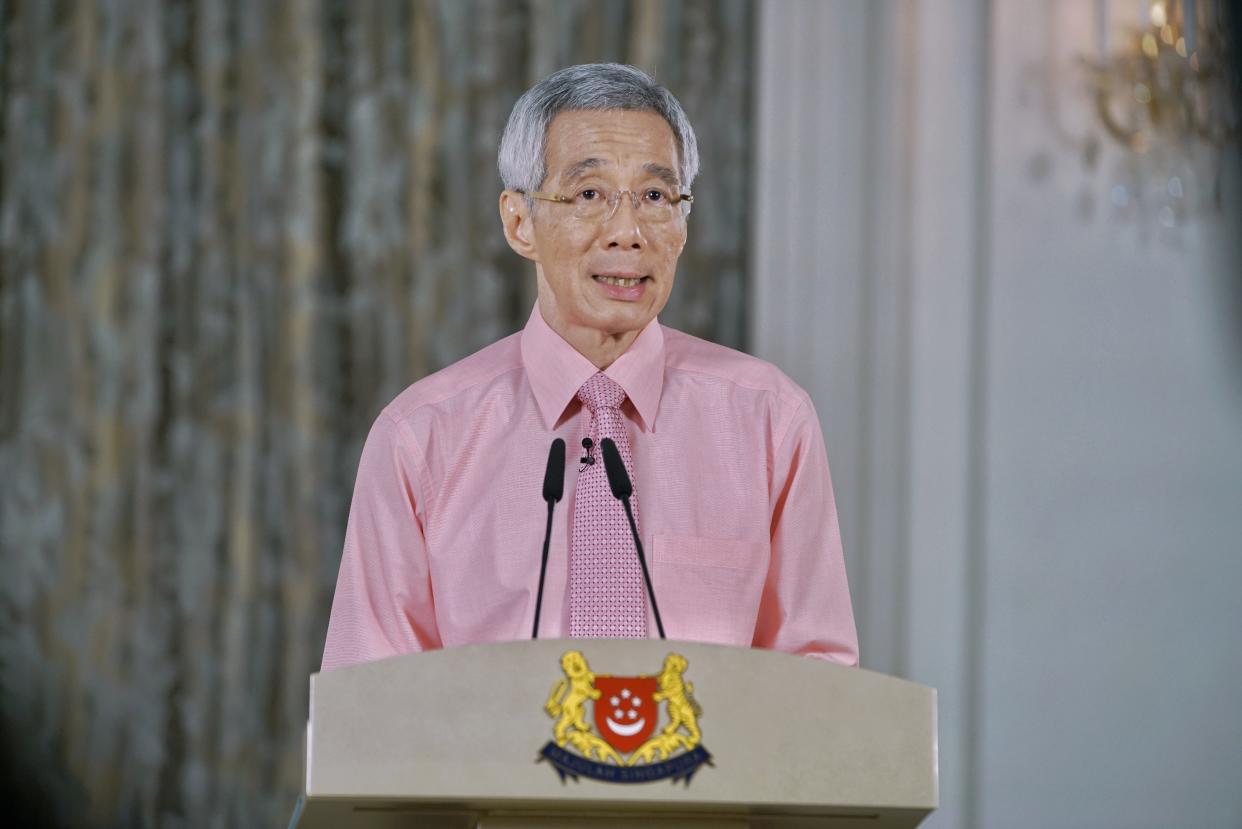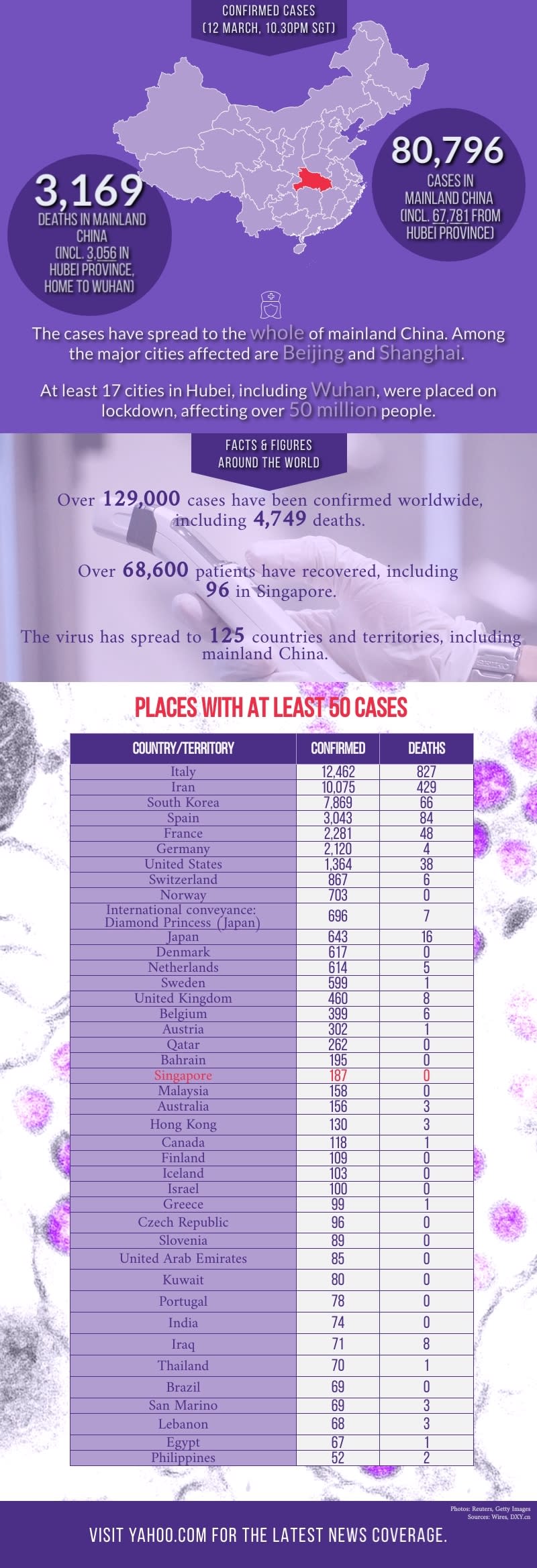COVID-19: Singapore planning ahead; no Dorscon red, no lockdown, says PM Lee

SINGAPORE — While Singapore will neither be escalating its national disaster alert response level nor be locked down like other countries in response to the ongoing COVID-19 pandemic, authorities here will plan ahead for more stringent measures to combat a potential spike in cases, said Prime Minister Lee Hsien Loong on Thursday (12 March).
“We are not going to DORSCON (Disease Outbreak Response System Condition) red. We are not locking down our city like the Chinese, South Koreans or Italians have done,” said Lee.
“What we are doing now is to plan ahead for some of these more stringent measures, try them out, and prepare Singaporeans for when we actually need to implement them.”
Lee’s remarks were shared in his second televised speech on the outbreak at 8pm. His 11-minute speech in English – as well as those made in Mandarin and Malay – was also shared on his social media accounts and on the YouTube channel of the Prime Minister's Office.
Lee first addressed the nation on the subject on 8 February, a day after Singapore's disease outbreak response was escalated up one level to orange.
In his speech on Thursday, Lee noted that the World Health Organization (WHO) has declared the coronavirus outbreak a pandemic, with it expected to “continue for some time – a year, and maybe longer”.
“The WHO named one key reason for the rapid spread: many countries had not taken the situation seriously enough – what the WHO called “alarming levels of inaction”,” Lee added.
“Here in Singapore, we have all along taken COVID-19 with the utmost seriousness. In fact, the WHO praised our efforts and held Singapore up as an example to emulate.”
He stressed, however, that Singapore still faces “a serious situation” even as it remains “under control” here, with more imported cases, new clusters and new waves of infection to be expected from several countries, rather than just one or two.
To date, Singapore has 187 confirmed cases of the virus, of which 96 have fully recovered and have been discharged from hospital. Nine are in critical condition in the intensive care unit.
Allocating hospital resources
While Singapore has already imposed some travel restrictions – for instance, for China, Iran, South Korea, Italy – Lee noted that authorities here will have to tighten up restrictions further temporarily, “though we cannot completely shut ourselves off from the world”.
In the scenario where there is a large spike in COVID-19 cases, he said that Singapore will not be able to hospitalise and isolate every infected patient “like we do now”.
He noted, “But we now know that the majority of patients, in fact, 80% of them, only experience mild symptoms. The ones that are most at risk are the elderly, and those with pre-existing conditions like high blood pressure or lung problems.”
With a larger number of cases, the “sensible” thing to do will be to hospitalise only the more serious cases, and encourage those with mild symptoms to see their family general practitioner and rest at home – isolate themselves, he added.
“This way, we focus resources on the seriously ill, speed up our response time, and hopefully, minimise the number of fatalities,” Lee explained.
Singapore authorities, in the meantime, are freeing up intensive care units and hospital beds as well as facilities, to create additional capacity to meet any surge in COVID-19 numbers, he said.
“But rest assured, any Singaporean who needs urgent medical care, whether for COVID-19 or other illnesses, will be taken care of,” Lee added.
More social distancing measures
Lee said that additional social distancing measures will also be necessary to combat the possible spike in cases.
These temporary measures – or “extra brakes” – can range from the suspension of school, the staggering of work hours as well as compulsory telecommuting, he added.
These “extra brakes” will slow down the transmission of the virus, prevent Singapore’s healthcare system from being overwhelmed, and help bring the numbers back down, said PM Lee.
“After the situation improves, we can ease off and go back to the baseline precautions,” he noted. “But let me emphasise this: the situation in Singapore remains under control.”
Baseline precautions that Singaporeans must get used to include practising good personal hygiene, adopting new social norms and discouraging large gatherings – “generally, maintaining some physical distance from one another”, he said.
For instance, community activities, especially for the seniors, have been scaled down.
More can be done in other areas, such as religious gatherings, said Lee, citing the Shincheonji church-related COVID-19 cases in South Korea and Singapore’s “big” clusters related to two churches.
He also pointed out that several Singaporeans who had attended a big international religious gathering in Kuala Lumpur recently have tested positive for the virus. To date, at least 14 COVID-19 cases, including two Singaporeans and Brunei's first cases of the virus, have been linked to the event.
As a result, the Islamic Religious Council of Singapore announced earlier on Thursday that all mosques here will be closed for five days for disinfection. On the same day, Archbishop of Singapore William Goh announced that Catholic masses will remain suspended.
“The issue is of course not religion itself, but that the virus can spread quickly to many people in crowded settings, like religious gatherings and services,” said Lee, citing Saudi Arabia’s decision to temporarily stopped umrah pilgrimages and the Pope’s live-streamed sermons to avoid crowds on Saint Peter’s Square.
“I hope Singaporeans understand that during this period we may need to shorten religious services, or reduce our attendance at such gatherings,” he added. “Please work with your religious leaders to make these practical adjustments.”
Psychological resilience
Lee also spoke about the importance of psychological resilience during this outbreak.
“Our frontline staff are working extremely hard to keep Singapore going – healthcare workers, immigration officers, civil servants, public transport workers, taxi drivers, cleaning staff. Singaporeans are cheering them on,” said Lee.
He pointed out that the government has been open and transparent with its plans as well as took the opportunity to thank Singaporeans for their trust and support.
“When we made direct appeals to Singaporeans, for e.g., only wear face masks when unwell; or not to worry about our supermarkets running out of food or household items, people accepted our reassurances, and behaviour changed,” said Lee.
“I am grateful that most Singaporeans are responding calmly and responsibly.”

Stay in the know on-the-go: Join Yahoo Singapore's Telegram channel at http://t.me/YahooSingapore
Related stories:
COVID-19: Singapore economy taking ‘big hit’, nobody has been spared – PM Lee
COVID-19: MOH tracking 95 Singaporean attendees of religious event in Malaysia
COVID-19: Singapore confirms nine new cases, total at 187
COVID-19: Stay home if you're unwell during Qing Ming peak period, says NEA
Case 138: MOH clarifies about man who tested positive for COVID-19 after ending quarantine



